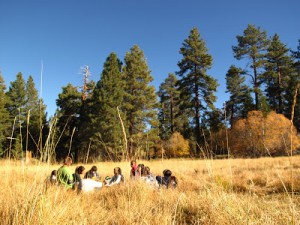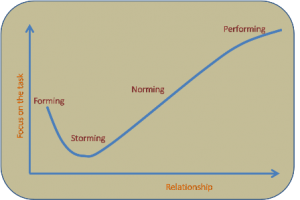At High Trails Outdoor Science School we teach thousands of students from over 100 schools each year. High Trails students learn hands-on about their environment and themselves in small groups with students from outside their normal class in school. While this is a great learning opportunity, it presents a unique challenge for our instructors. High Trails instructors only have a few days with their students in which to create a functional learning group. Understanding group development is key to being a successful outdoor school instructor. As instructors, we must guide students through this process to maximize their learning, growth, and enjoyment during their short time at High Trails.
The first stage in this process, as described by Bruce Tuckman, is forming. Students who may have not met each other before arriving at High Trails get to know the people with whom they will be spending their week. Field groups have their Team Discovery Hike, our introductory class, and cabins have their first Tribes meeting, a community building class.
 Concepts of community and teamwork are explored and ground rules for learning and living together are laid out with goals for the week written down in a group contract. At this point students are focused on learning names, making new friends, getting familiar with the schedule, and learning where things are. They are unlikely to want or be able to focus on serious issues or share more than superficial feelings. It’s important for instructors to be directive during this stage, as students will tend to be focused on themselves and not attentive to the needs of the group.
Concepts of community and teamwork are explored and ground rules for learning and living together are laid out with goals for the week written down in a group contract. At this point students are focused on learning names, making new friends, getting familiar with the schedule, and learning where things are. They are unlikely to want or be able to focus on serious issues or share more than superficial feelings. It’s important for instructors to be directive during this stage, as students will tend to be focused on themselves and not attentive to the needs of the group.
The next stage is storming, during which students jockey for social position and begin to confront each other and each other’s ideas. Individual roles, strengths, and niches within the group are established during this stage. It’s very hard for groups to function efficiently without going through this stage, as this is where students work past their differences and learn to actually get along with each other.
Many groups, especially with the age group and time constraints we have at High Trails, never fully move beyond this stage, with  issues continuing to simmer without being fully resolved. It is important as an instructor to actively manage the group through this stage to avoid conflict from getting out of hand. Creating an open and non-judgmental space for discussion and feelings to be shared is imperative. The Turnstiles experiment at the end of Team Discovery is designed to aid in this process.
issues continuing to simmer without being fully resolved. It is important as an instructor to actively manage the group through this stage to avoid conflict from getting out of hand. Creating an open and non-judgmental space for discussion and feelings to be shared is imperative. The Turnstiles experiment at the end of Team Discovery is designed to aid in this process.
Field groups can often be seen operating in this stage during the Adventure Course class, which focuses on teamwork. The instructor’s role at this point is to support the group as students begin to provide constructive feedback to each other and collaborate more.
Many groups never get to the next stage of development, and it shouldn’t be expected in the short week that we have students at High Trails. The performing stage is characterized by autonomy and group members making decisions without external supervision. Supervisors of groups at this stage take on a participative role as effective problem-solving and conflicts are dealt with internally.
Students at High Trails are sometimes given a brief taste of this during their Outdoor Survival Hike, when instructors step back and give students a moment to plan their next step in a survival scenario.
As a High Trails instructor, recognizing the development stage of your group of students, and adjusting the level of responsibility and challenge you give them accordingly, can have a big impact on their experience and yours.
At High Trails Outdoor Science School, we literally force our instructors to write about elementary outdoor education, teaching outside, learning outside, our dirty classroom (the forest…gosh), environmental science, outdoor science, and all other tree hugging student and kid loving things that keep us engaged, passionate, driven, loving our job, digging our life, and spreading the word to anyone whose attention we can hold for long enough to actually make it through reading this entire sentence. Whew…. www.dirtyclassroom.com

Comments are closed.